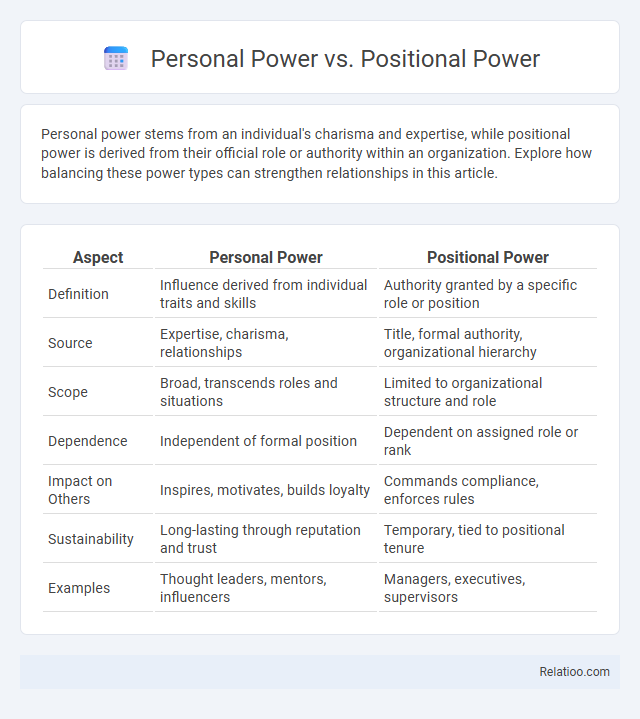Personal power stems from an individual's charisma and expertise, while positional power is derived from their official role or authority within an organization. Explore how balancing these power types can strengthen relationships in this article.
Table of Comparison
| Aspect | Personal Power | Positional Power |
|---|---|---|
| Definition | Influence derived from individual traits and skills | Authority granted by a specific role or position |
| Source | Expertise, charisma, relationships | Title, formal authority, organizational hierarchy |
| Scope | Broad, transcends roles and situations | Limited to organizational structure and role |
| Dependence | Independent of formal position | Dependent on assigned role or rank |
| Impact on Others | Inspires, motivates, builds loyalty | Commands compliance, enforces rules |
| Sustainability | Long-lasting through reputation and trust | Temporary, tied to positional tenure |
| Examples | Thought leaders, mentors, influencers | Managers, executives, supervisors |
Understanding Personal Power and Positional Power
Personal power stems from your unique qualities such as expertise, charisma, and trustworthiness, enabling you to influence others through respect and admiration. Positional power derives from formal authority granted by your role or position within an organization, allowing you to enforce rules and allocate resources. Understanding the balance between these forms of power is crucial for navigating competitive dynamics, as leveraging personal power often fosters collaboration while relying solely on positional power may provoke resistance.
Defining the Core Differences
Personal power derives from an individual's unique qualities, such as charisma, expertise, and interpersonal skills, enabling influence beyond formal authority. Positional power is rooted in an official role or title within an organizational hierarchy, granting authority through mandated control and decision-making rights. Competitive dynamics arise when personal and positional powers interact, often influencing workplace behavior, motivation, and organizational performance through power struggles or collaboration.
Sources of Personal Power
Sources of personal power stem from individual attributes such as expertise, charisma, and the ability to build strong relationships, distinguishing it from positional power which relies on formal authority granted by an organizational role. Unlike positional power, personal power is grounded in trust, respect, and influence gained through competence and interpersonal skills. In competitive dynamics, leveraging personal power enables individuals to navigate complex social environments effectively by inspiring collaboration and motivating others beyond hierarchical constraints.
Sources of Positional Power
Sources of positional power stem from formal authority linked to your job title, control over resources, and the ability to reward or punish others, which directly influence organizational behavior. Unlike personal power derived from expertise or charisma, positional power relies on the structure of roles and hierarchies within a competitive dynamic where individuals vie for influence and control. Understanding these sources helps you leverage your official role effectively to achieve strategic goals.
Advantages of Personal Power in Leadership
Personal power in leadership stems from individual attributes such as expertise, charisma, and trustworthiness, enabling leaders to inspire and motivate teams effectively. Unlike positional power, which relies on formal authority and organizational hierarchy, personal power fosters genuine connections and promotes collaboration. This intrinsic influence drives higher employee engagement, creativity, and long-term commitment within competitive dynamics.
Limitations of Relying on Positional Power
Relying solely on positional power can limit your influence because it depends on formal authority rather than genuine respect or trust from others. Positional power may lead to compliance but often lacks the motivational force to inspire long-term commitment or innovation within teams. Understanding competitive dynamics requires blending personal power with positional authority to build authentic relationships and sustain influence beyond hierarchical status.
Building Personal Power: Key Strategies
Building personal power hinges on developing expertise, cultivating strong relationships, and demonstrating consistent integrity, which fosters trust and influence beyond formal authority. Emphasizing emotional intelligence and effective communication allows individuals to inspire and motivate others, creating a collaborative environment that strengthens their personal power. Unlike positional power that relies on titles, personal power emerges from credibility and respect, enabling sustainable influence in competitive dynamics.
When to Use Positional Power Effectively
Positional power is most effective in situations requiring clear authority, such as enforcing rules, making urgent decisions, or managing hierarchical structures where compliance is critical. Use positional power to provide direction during crises or organizational changes to maintain order and ensure accountability. Balancing positional power with personal power can enhance leadership influence and foster a cooperative competitive dynamic.
Balancing Personal and Positional Power for Success
Balancing personal power, rooted in your skills, charisma, and relationships, with positional power, derived from your official role and authority, is crucial for effective leadership and long-term success. Ignoring personal power can lead to reliance solely on authority, causing disengagement, while overemphasizing personal influence without position may limit organizational impact. Understanding the competitive dynamic between these powers enables you to navigate workplace challenges, fostering collaboration and driving sustainable results.
Real-World Examples: Lessons from Leaders
Personal power, exemplified by leaders like Nelson Mandela, stems from influence and charisma, fostering trust and collaboration beyond formal authority. Positional power relies on an official role or title, such as CEOs like Tim Cook who leverage organizational hierarchy to drive decision-making and enforce policies. Competitive dynamics emerge in environments like tech companies where leaders must balance personal influence and positional authority against rivals, exemplified by Elon Musk's strategic maneuvers in SpaceX and Tesla, highlighting the interplay between power types in achieving market dominance.

Infographic: Personal Power vs Positional Power
 relatioo.com
relatioo.com